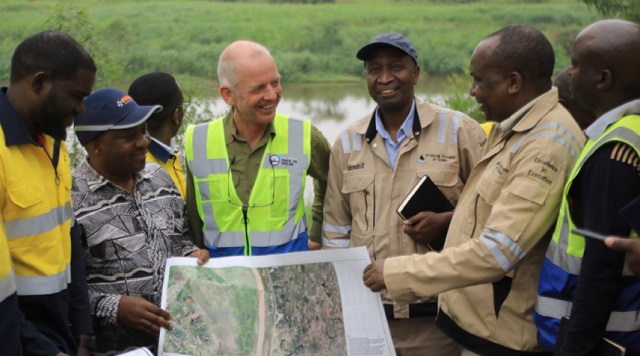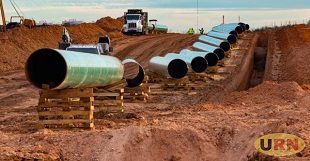
The two countries are harmonizing relevant laws and approval processes to hasten pipeline construction
Kamapala, Uganda | RONALD MUSOKE | Senior officials from Uganda’s petroleum authority (PAU) and Tanzania’s energy and water utilities regulatory authority (EWURA)—the agencies that have regulatory powers over the oil industry in the two countries—have renewed their commitment to secure the East African Crude Oil Pipeline (EACOP).
The officials have agreed to jointly cooperate in the regulation and monitoring of the design, construction, operation, maintenance, and commissioning of the EACOP.
The pledge was made recently during a joint five-day supervisory field visit to the Uganda section of the EACOP with specific interest in areas that will host key support infrastructure like the pump stations, construction main camp and pump yards, environmentally sensitive areas, and resettlement projects for the project affected persons.
The visit started on Aug.15 in Karagwe in northern Tanzania and ended on Aug.22 with visits to the project areas in the Albertine region. The two sets of officials also held a joint review meeting at Entebbe, Uganda. A similar joint visit by the two regulatory entities is planned for the Tanzanian section of the pipeline route that will be led by the energy and water utilities regulatory authority of Tanzania.
The EACOP, a US$ 3.5bn project is one of the three major oil and gas infrastructure projects Uganda and its partners including; TotalEnergies E&P Uganda Ltd, CNOOC Uganda Ltd, the Uganda National Oil Company (UNOC) and the Tanzania Petroleum Development Corporation (TPDC) are working tirelessly to build before commercialization of the country’s petroleum resources in 2025.
The pipeline will be the longest heated crude oil outlet in the world, at 1,443km, running from Kabaale in the mid-western Uganda district of Hoima to the Tanga port on the Tanzanian coast of the Indian Ocean. In Uganda, the pipeline covers 296km and cuts through 10 districts, 22 sub-counties, four small towns, 41 parishes and over 170 villages.
Ernest Rubondo, the executive director at the PAU said the joint supervisory visit provided an opportunity to review what the two regulatory entities have achieved and what they need to do better going forward.
“The goal is to use all our efforts to ensure that our people benefit from this (EACOP) project and have a harmonised voice on aspects related to monitoring and regulation,” he said.
Modestus Martin Lumato, the Director General of EWURA said the visit to the Ugandan section of the EACOP and the ongoing upstream activities for the Tilenga and the Kingfisher projects called for accelerated efforts to achieve project alignment between the upstream and midstream.
“With what we have seen in the ongoing construction works upstream, we shall expedite the processing of the necessary approvals for the construction of the EACOP to kick off,” said Lumato upon completing the tour of the Kingfisher project in Kikuube.
“Our law (Tanzania) gives us 60 days, but our customer service charter recommends 30 days from receipt of complete application. We, therefore, plan to have the review process completed in the next 30 days before the award of approvals”, said Gerald Maganga, the Director of Petroleum at EWURA.
The meeting between the officials of the two governments’ parastatals came at the backdrop of the application for the construction license filed by the EACOP Company to both the Uganda and Tanzanian governments at the beginning of last month, where the Uganda government is required to respond within 180 days.
During a review meeting for the visit at the PAU offices in Entebbe, the officials committed to continue working closely in the review process for the construction approvals made by the EACOP Company.
Unlike the Tanzanian law, the Ugandan law allows the licensing entity which in this case is the Ministry of Energy and Mineral Development to grant approval for a construction licence within 180 days after application.
Dozith Abeinomugisha, the Director Midstream at the Petroleum Authority of Uganda committed to harmonise the review process of approvals required for construction of the project with different timelines in the respective laws.
A Memorandum of Understanding (MoU) between the two parties signed in 2019 calls for enhancement of cooperation in promoting a harmonised regulatory framework for the EACOP, including harmonising the approval requirements processes, guidelines, inspection manuals, inspection checklist, rules, and any other requirement as may be deemed necessary.
National content aspects
The two parties further committed to ensuring that the national content aspects are jointly monitored and retrospectively adhered to in both Uganda and Tanzania, establish closer and more regular contacts and promote cooperation in activities, safe operations that consider best industry practices, and the safety, health and environmental protection standards related to the EACOP Project.
Other areas that called for joint co-operation include demystifying the myths surrounding the EACOP that have brought the project in disrepute with a section of environmental lobby groups campaigning against it.
All the objectives of the MoU are pursued in accordance with the Intern Governmental Agreement (IGA), Host Government Agreement (HGA), applicable laws, rules, and regulations of the Republic of Uganda and of the United Republic of Tanzania. Tanzania, Uganda and TotalEnergies signed the Host Government Agreement for the EACOP in September 2020.
****
 The Independent Uganda: You get the Truth we Pay the Price
The Independent Uganda: You get the Truth we Pay the Price



